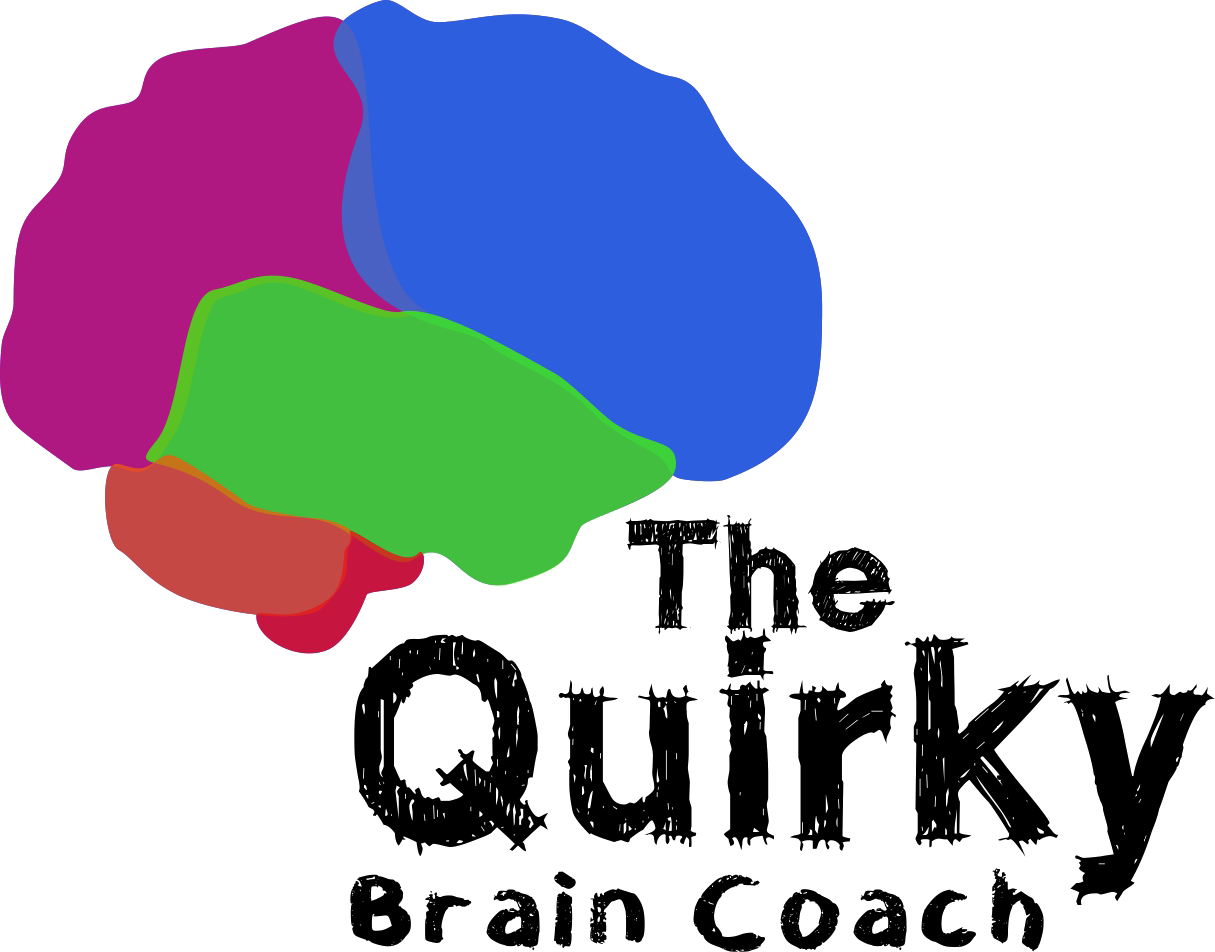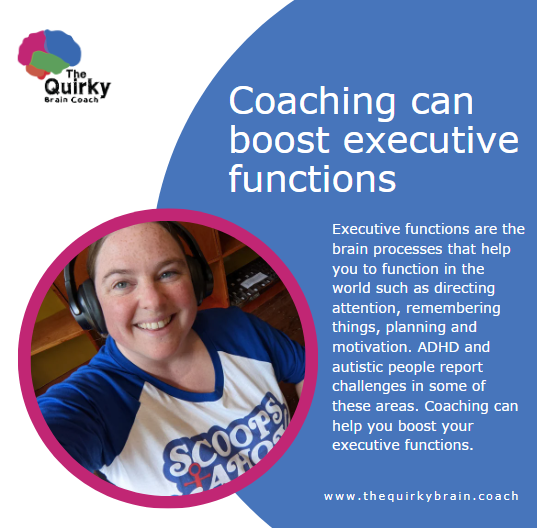3 ways that coaching boosts your executive functioning
Yesterday, I had a conversation about what content I produce. I received the feedback that I do not write enough content about what coaching is, how it works, and how it directly supports certain neurotypes.
On reflection, I felt that was a fair point. I’m passionate about how coaching works and how it can directly support people’s brains, and I’m not sure that I’m saying enough about it.
So, in this post, I’ll tell you about 3 ways that coaching can boost your executive functioning – and how that can help you. I think we should remind ourselves how I see coaching first of all.
What is coaching?
I think coaching is a professional helping conversation or series of conversations. In it, you identify wishes, themes to explore or goals and I ask you a series of questions about your thoughts and options relating to those topics. By having the conversations, you work out what you want in life, and what you could have, be or do in order bring your wishes and goals to life. You also work out your own doable and realistic ways of doing that. Along the way, your coach provides feedback and encouragement, and reflects back to you things that you have said but which you may not yet have noticed or explored the impact of fully.
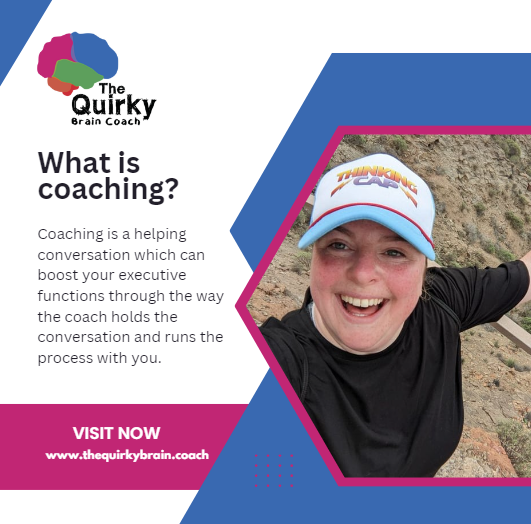
In my coaching, I also provide models, worksheets and reflection questions for use in your own time if you wish to support you to develop skills that would benefit you in meeting your coaching aims.
Executive functioning
What is executive functioning? Think of your executive functions as a set of really crucial high level brain processes that help humans to operate in the world to stay alive, meet their goals, and avoid obstacles to their goals.
Examples of executive functions are working memory, self-monitoring, impulse control and allocation of your attention.
With ADHD and autism, it is documented in the research and in lived experience accounts that some of the executive functions are impacted. In my life, my executive function of impulse control is heavily impacted by my ADHD, and I choose to take medication to support me with this.
My autism can mean I am not as flexible or fluid in my thinking as I would like to be sometimes, and this links with the executive function of cognitive flexibility.
Coaching can help with lots of executive functions in many ways but there are 3 executive functions that coaching can really help with:
- The direction of attention
- Self-monitoring
- Motivation to start (task initiation)
I’ll go through each of these, explaining how these functions could be impacting you, and how coaching helps to boost these executive processes.
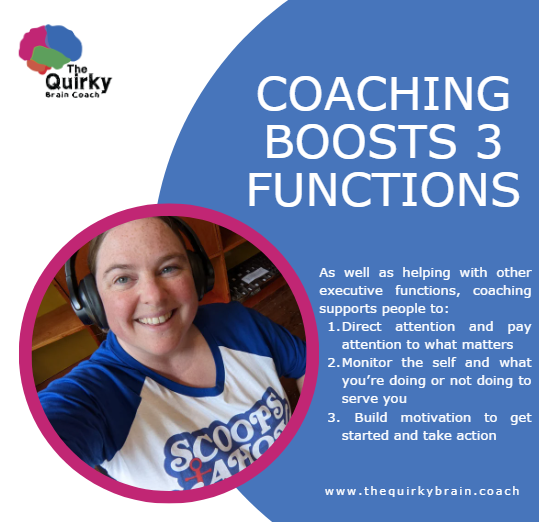
Function 1: Coaching helps you to direct attention to what matters
Many of my clients tell me that they can pay attention to what is interesting or urgent right now in the moment, but they struggle to deliberately think about further-off or less important matters.
This can impact your life more than you know. If you’re only thinking about what’s happening TODAY, then you will likely find it difficult to plan for the future and keep your longer-term goals alive in your mind. And if that happens, one day you can wake up and realise 5 years has passed and you still did not tick a big wish off your bucket list/career progression list.
So how can coaching help?
Positive psychology coaching researcher Robert Biswas-Diener (2023) wrote that coaching is a conversational tool for directing attention. Attention is directed by me, the coach, asking you questions. If I ask you a question about the future, you can’t help but think about it, or, in other words, direct your attention to it.
By the coach asking you regular questions about your goals and how to get there, your longer-term matters receive more prominence and importance in your mind – they become more “activated”. Pathways are formed in the brain that make it easier to call to mind and think about these things over time. After a few weeks, you find that you’re thinking more often about longer-term goals under your own steam and, often, this leads to people naturally taking action to help them get to where they want to be.
If you feel that you don’t think enough about wishes and goals several months or years away and want to pay more attention to this, then coaching conversations are pretty much guaranteed to help. I just have to ask you about these things!
Function 1: Coaching helps you to monitor yourself (and what you are doing that’s serving you)
Self-monitoring is the ability for a human to keep an eye on what they are doing/not doing. It’s about being able to notice and reflect on what you are doing or not doing relating to present habits or future goals.
A crucial thing for achieving a goal is being able to self-monitor whether you’re on track or not, and whether you’re taking regular steps towards your goals.
With ADHD, if you experience overwhelm or have difficulties taking a moment to be reflective, this can be a challenge. With autism, it can be hard to know how you feel or be able to see into the future – especially if you’re focused on something that you’re very interested in right now. Does any of this happen for you?
With me, I struggled a lot with self-monitoring in the past. I used to have a lot of goals but never thought about what I needed to do on a regular basis to achieve them. I also had no way of checking in with myself to see whether or not I was on track. Until I had coaching, and learned to self-coach, that is.
In coaching, we build self-monitoring by
- Me asking what you are doing regularly to help your desires come to fruition in life
- Me asking you what you’re not doing or what habits are missing right now
- Celebrating successes (big and small) as you progress in coaching
- Learning about and adopting tools like reflection models or a journalling practice
As a result, people working with me build up a richer and more current picture of what they are doing so they can adjust it. Think of a ship trying to get into a harbour. The ship’s captain needs to know where it is, where the harbour is, and how much to adjust the course and how in order to safely steer in. Think of the coach as a co-captain, helping you to get the data you need so you can steer to where you want to go.
Function 3: Coaching helps with motivation to get started
One of the things I hear most often as a coach is: I have no motivation. I can’t get started. Even for things I enjoy.
Believe me when I say that I have experienced this myself in life, and still face this now on a regular basis. It can be incredibly frustrating to have wishes for yourself that you don’t seem able to follow through on. It has severely knocked my confidence and belief in myself on more than one occasion.
Luckily, there is something you can do about it. There are two things relating, in particular, to ADHD that coaching conversations can really help with.
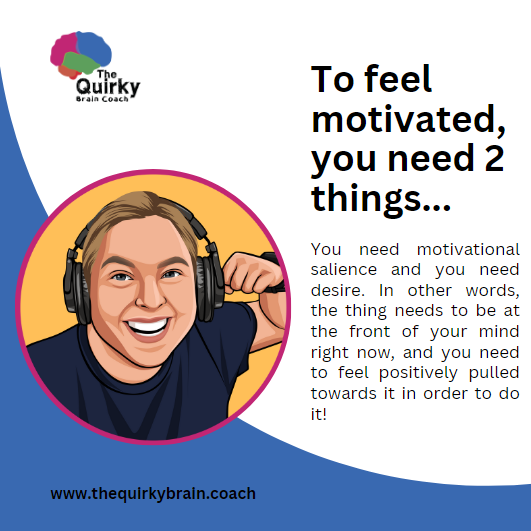
1 Increasing motivational salience
Motivational salience is just a wordy way of saying that something becomes so big and attractive at the front of your mind that you pretty much can’t help but do something about it.
Suppose you used to exercise by walking your dog (and you even used to really enjoy it) but you’re not doing it any more. You want to get started again.
A good coach will ask you to recount all the benefits, enjoyment, and interest when you last did this. As you recall these things, it becomes more apparent to your brain that you can experience these things again and you can experience them…pretty much right now.
It’s not uncommon for a client to tell me something like this and then, an hour after our coaching session, I get an email saying: Becci, I walked the dog. It was brilliant. Thanks for talking to me about that.
Notice that I didn’t have to force the client to do anything (and I never would), and the client didn’t even have to deliberately try to do anything. They wanted to, and so they did. Coaching conversations naturally build motivation to do things, and so people…go off and do things.
2 Building desire
One of the ingredients of motivation is desire.
In life, all humans have things that they need to do but do not find especially interesting or attractive. However, if you have ADHD, for example, this is a real challenge. If I do not feel positively pulled along and full of desire and interest by the thing I want to do, it probably won’t happen.
Motivation itself is just an emotional force that swells up inside your mind and becomes so big that you can’t help but do the thing, as I mention above.
Coaching helps you to build that groundswell of desire by helping you get clear on
- the benefits of doing a thing
- the enjoyment and interest you can tap into from doing a thing
- how easy or doable the thing can actually be (we can break tasks down and make them more achievable)
- boosting your confidence that you have the skills and resources to succeed
- how the future looks, sounds or feels once you have done the thing (and how successful, relieved or proud you might rightly feel afterwards)
I am walking to Everest Base Camp soon. I was motivated for going on the trip, as it’s exciting. But I was not motivated to do the training on a regular basis!
By having coaching and doing some journalling alongside, I understood:
- how my health would be less at risk by training
- how proud I would feel when I reach Everest Base Camp
- how I could use data to see my fitness improving on a daily basis (very motivating)
- what would make my exercise more doable and achievable (small intense walks in different places, taking my dog for company)
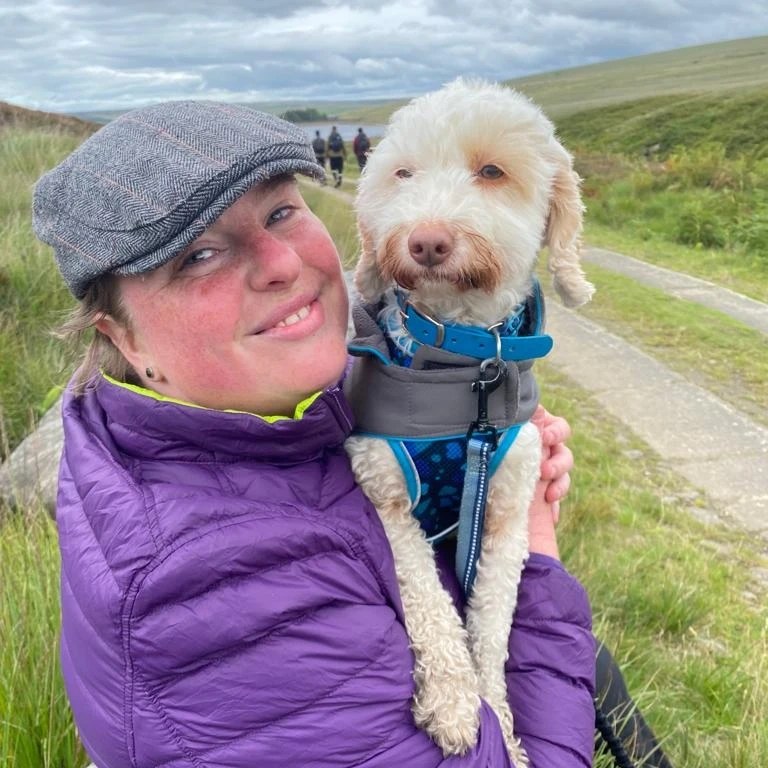
This allowed me to find the motivation to get outside more regularly to prepare my body for this challenging hike.
If you know that you’re struggling to get motivated, then you can see how coaching can naturally build up that force you need to quite literally move your ass and do something in service of your goals.
Do I have to work with a coach to boost my executive functions?
Yes and no.
Let’s go to the no first.
Not everyone needs to work with a coach or, realistically, can work with a coach – or you may not even want to.
It is possible to coach yourself. However, for it to work, you need to be reasonably confident of being able to do 3 things.
- You need to create protected, diarised time to commit to working with yourself.
- You need some kind of existing journalling, mindmapping or creative practice to help you to work through your thoughts in a structured way.
- You need questions, prompts or reflective worksheets/models to help you work through and record your thoughts – and set actions for yourself off the back of these.
If you have 1-3 and can do these on your own without support, you can self-coach to great success.
If you don’t have 1-3 or believe you lack skill and/or confidence in 1-3, then you should consider working with a coach to help you.
Coaches provide 1-3 for you, and walk you through them, building your skills so that you can self-coach in a few months’ time.
Consider your current resources and ability to follow through on 1-3 by yourself, and if you think you need someone to show you the way, that’s when you should reach out to a coach if it’s within your means.
Wrap-up and the big takeaway
Executive functions are the brain processes that help you move around and do what you need in the world. ADHD and autistic people can experience executive function challenges which can make it harder to think about what’s important to them and act on it – and remember to do so.
Coaching serves to boost the executive functions by having particular conversations and the coach asking particular questions of you.
The big takeaway is this: it’s usually possible to improve some of your executive functions to a degree, with help. We’re not as fixed as you might think. Coaching helps you to pay attention to what’s important to you, monitor how you’re getting on with bringing that to life, and helps you to drive motivation for getting what’s important done.
Get support
If you want to work with me, you can reach out to yourcoach@quirkybrain.coach
If you’d like to make use of my free-to-access resources, you can sign up for my newsletter or you can follow my podcast on podbean or Spotify. There’s also my Facebook page, where I share a lot of journalling and self-coaching ideas.
For my readers in academia, I should let you know that my first group coaching programme for ADHD/autistic academics is coming later this year…so keep your eyes peeled!
